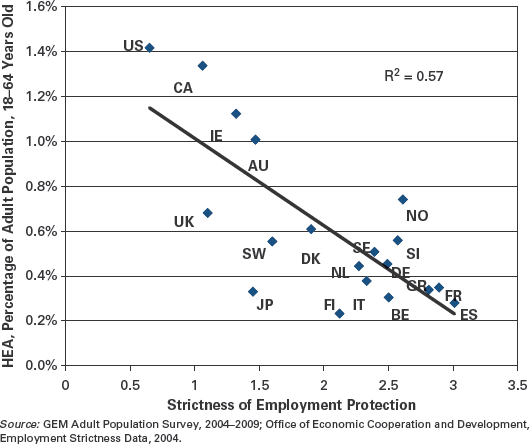1.5. 21st-Century Economies: Anglo-Saxon or Social Models?
It is very interesting that a group of nations with so-called Anglo-Saxon economic systems (the United States, Canada, Ireland, and Australia) has higher HEA rates—which translate into more job creation—than does a group of European nations with strong social models (Denmark, Sweden, Finland, the Netherlands, Germany, and France).
Figure 1.10 shows that the stricter a county's employment security, the lower its early-stage HEA rate. [] Stricter employment protection inhibits HEA in two ways: First, it makes would-be HEA entrepreneurs more reluctant to give up a secure job to start their own company; second, if they start one, it makes them more hesitant to hire employees because firing them is costly. Of course, the optimal balance depends on a nation's norms and social values. However, the results in Figure 1.10 suggest that lowering employment protection may benefit employees in the longer term because of the possibility that more jobs will be created by these early-stage HEA entrepreneurs.
Figure 1.10. Strictness of employment protection and early-stage HEA rates in 2004-2009

Here is U.K. Prime Minister Tony Blair's challenge for Europe in his address to the European Parliament in June 2005:[]
What would a different policy agenda for Europe look like? First, it would modernize our social model. Again some have suggested ...
Get Entrepreneurship, Second Edition now with the O’Reilly learning platform.
O’Reilly members experience books, live events, courses curated by job role, and more from O’Reilly and nearly 200 top publishers.

